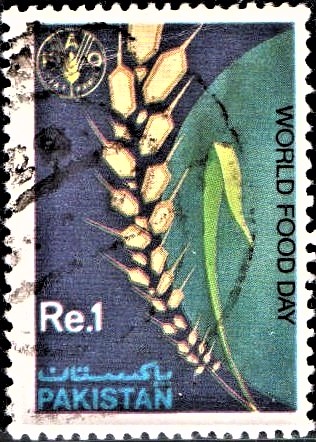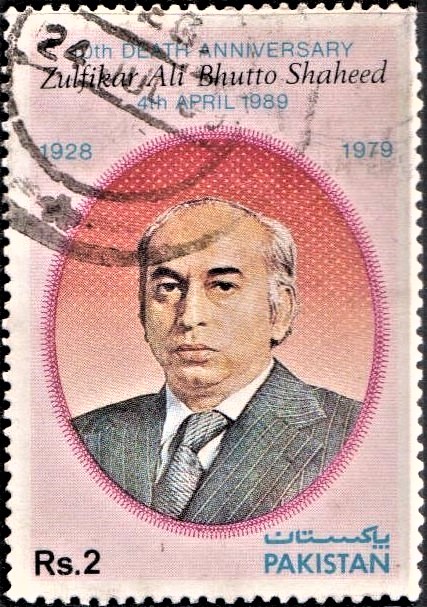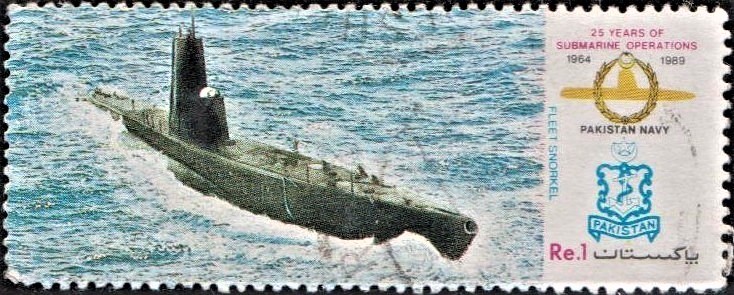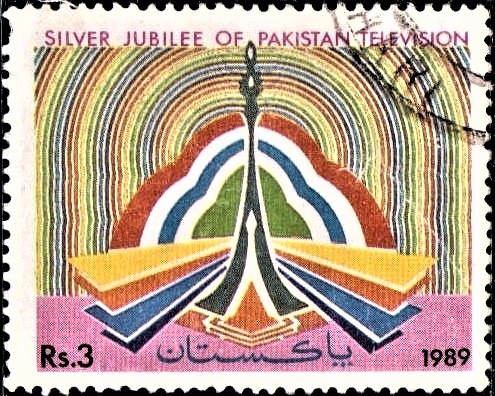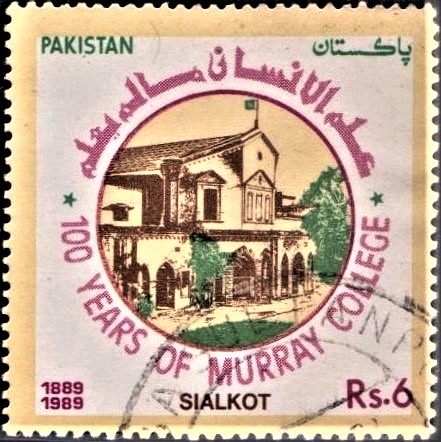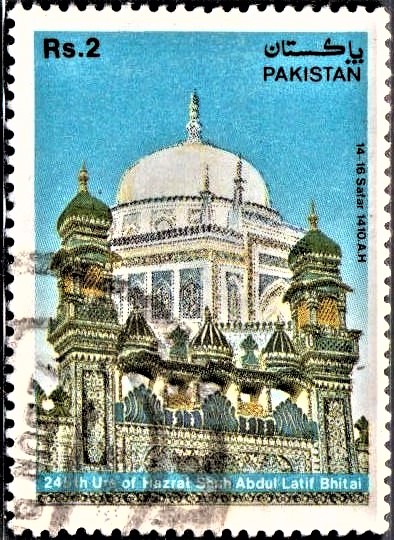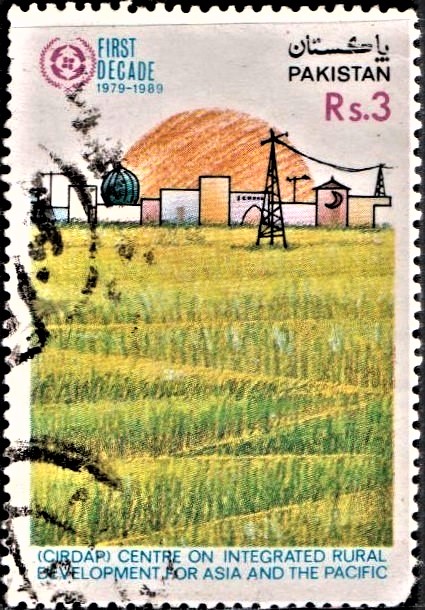
Pakistan on Centre on Integrated Rural Development for Asia and the Pacific
A commemorative postage stamp on the 10th Anniversary of the Centre on Integrated Rural Development for Asia and the Pacific (1979–1989) (CIRDAP) :
 Issued by Pakistan
Issued by Pakistan
Issued on Dec 31, 1989
Issued for : To commemorate the Tenth Anniversary of the Centre on Integrated Rural Development for Asia and the Pacific (CIRDAP), Pakistan Post Office is issuing a stamp of Rs. 3/- denomination on December 31, 1989.
Designer : Adil Salahuddin
Type : Stamp, Postal Used
Denomination : Rs. 3/-
Colour : Multi Colour
Size of Stamp :51 x 35 mm
Size of Print : 47 x 31 mm
Perforation : 13C
Paper : 102 gsm dual purpose coated PVA gum
Quantity : 4 Million
Number of stamps in a sheet : 56 stamps (8 x 7 rows)
Process of Printing : Litho Offset
Printer : Pakistan Security Printing Corporation
About :
- Background
- The Centre on Integrated Rural Development for Asia and the Pacific (CIRDAP) is a regional inter-governmental and autonomous institution. It was established in 1979 at the initiative of the countries of the Asia and Pacific Region and the Food and Agriculture Organization of the United Nations (FAO).
- Objectives
- The objectives of the Centre are
- (a) to assist national action and to promote regional co-operation relating to integrated rural development through a network of national institutions in Member States in the Asia and Pacific region, with the aim, in particular, of improving the production, income and living conditions of small-scale farmers and other needy rural groups and of encouraging their participation in social and economic life; and
- (b) to act as a servicing institution for its Member States, with respect to integrated rural development by providing them with technical support, by fostering the exchange of ideas and experiences and by encouraging such joint or collaborative activities as may benefit those States individually or collectively.
- The objectives of the Centre are
- Functions
- For the achievement of its objectives CIRDAP
- (a) conducts and through the national IRD Centres, promotes or assists research on various aspects of integrated rural development in the Region, with emphasis on alternative approaches leading to more effective field action programmes;
- (b) holds consultative conferences or other meetings enabling national decision-makers, research workers, planners and executives to exchange ideas and experiences on integrated rural development and to identify areas in which joint collaborative efforts would be promoted for the mutual benefit of Member States;
- (c) organizes training courses on planning, implementation and evaluation of programmes for integrated rural development and assists, where declared, the national IRD centres in implementing their respective training programmes;
- (d) provides technical support to national IRD centres and maintains liaison with such centres and with national, regional or international organizations or agencies concerned with integrated rural development;
- (e) serves as a clearing house and data bank for information on integrated rural development in the region and promotes the dissemination of information through publications and the preparation of documentation, including the translation of significant publications on integrated rural development; and
- (f) performs such other functions as may be necessary or useful for the attainment of its objectives.
- For the achievement of its objectives CIRDAP
- Organizational Setup
- Governing Council
- The Governing Council consists of one representative from each Member State. The current Chairman and Vice-Chairman are : Nepal and Malaysia, respectively. The Council serves as the policy making body and meets regularly once every two years.
- Executive Committee
- The Executive Committee consists of five members. These are the Host State and four other Member States elected by the Governing Council for a term of two years. The common members are : Bangladesh, India, Lao, Philippines and Sri Lanka. The Committee serves as the “working arm” of the Governing Council and performs functions delegated to it by the Council. It meets at least once a year.
- Technical Committee
- The Technical Committee serves primarily in an advisory capacity with regard to the technical and financial aspects of the programmes of the Centre. It meets at least once a year. The current members of the Committee are as follows : representative of the Government of Japan, representative of EDI of World Bank, the heads of national IRD centres of all member States, the Director-General of FAO or his representative; Prof. Hiroyuki Nishimura, Kyoto University, Japan as an IRD Expert, a representative of the Inter-Agency Committee on Integrated Rural Development for Asia and the Pacific, the Director of CIRDAP.
- IRD Network and Contact
- Ministries
- The Member States have designated the following Institutions and Ministries to act as Regional IRD network and contact points of CIRDAP, respectively :
Member Countries Link Institutions Contact Ministries Bangladesh : Bangladesh Academy for Rural Development (BARD), Kothari, Comilla. Ministry of LGRD & Co-operatives, Government of Bangladesh, Bangladesh Secretariat, Dhaka-2. India : National Institute of Rural Development (NIRD), Rajendranagar, Hyderabad 500 030. Department of Rural Development, Ministry of Agriculture and Rural Development, Krishi Bhavan, New Delhi 110001. Indonesia : Directorate General of Rural Development, Ministry of Home Affairs, Pasar Minggu, Jakarta Selatan. Ministry of Home Affairs, Jt. Merdeka Utara No. 7, Jakarta. Lao PDR : Ministry of Agriculture, Irrigation and Cooperative Vientiane. Ministry of Agriculture, Irrigation and Cooperative Vientiane. Malaysia : Ministry of Agriculture, Wisma Tani, Jalan Mahameru, Kuala Lumpur 10-02. Ministry of Agriculture, Wisma Tani, Jalan Mahameru, Kuala Lumpur 10-02. Nepal : Agricultural Projects Services Centre (APROSC) Ramchal Path, Kathmandu. Ministry of Panchayat and Local Development, Shree Mahal, Pulchowk, Kathmandu. Pakistan : National Centre for Rural Development (NCRD), Park Road, Chak Shahzad, Islamabad. Ministry of Local Government and Rural Development, House No. 20, St. No. 25, F-8/2, Islamabad. Philippines : National Council on Integrated Area Development (NACIAD), FBI Building, 80 Timog Avenue, Dilman, Quezon City. National Council on Integrated Area Development (NACIAD), FBI Bldg., 80 Timog Avenue, Dilman, Quezon City. Sri Lanka : Agrarian Research and Training Institute (ARTI) 114, Wijerama Mawatha, Colombo -3. Ministry of Agricultural Development and Research, Government of Sri Lanka, 73/1, Galle Road, Colombo -3. Thailand : Office of the National FAO Committee, Ministry of Agriculture and Co-operatives, Rajadamnoen Avenue, Bangkok. Ministry of Agriculture and Co-operatives, Government of Thailand, Rajadamnoen Avenue, Bangkok. Vietnam : International Co-operative Department, Ministry of Agriculture, No. 6 Nguyen cong Tru, Hanoi. International Co-operative Department, Ministry of Agriculture, No. 6 Nguyen cong Tru, Hanoi.
- The Member States have designated the following Institutions and Ministries to act as Regional IRD network and contact points of CIRDAP, respectively :
- Ministries
- Governing Council
- (Contributed by : Ministry of Local Government and Rural Development, Islamabad).
- Issued by The Director General, Pakistan Post Office Department, Islamabad.


